Sea Level Rise Flooding, Again; Town Budget Discussions
Mar 12, 2024
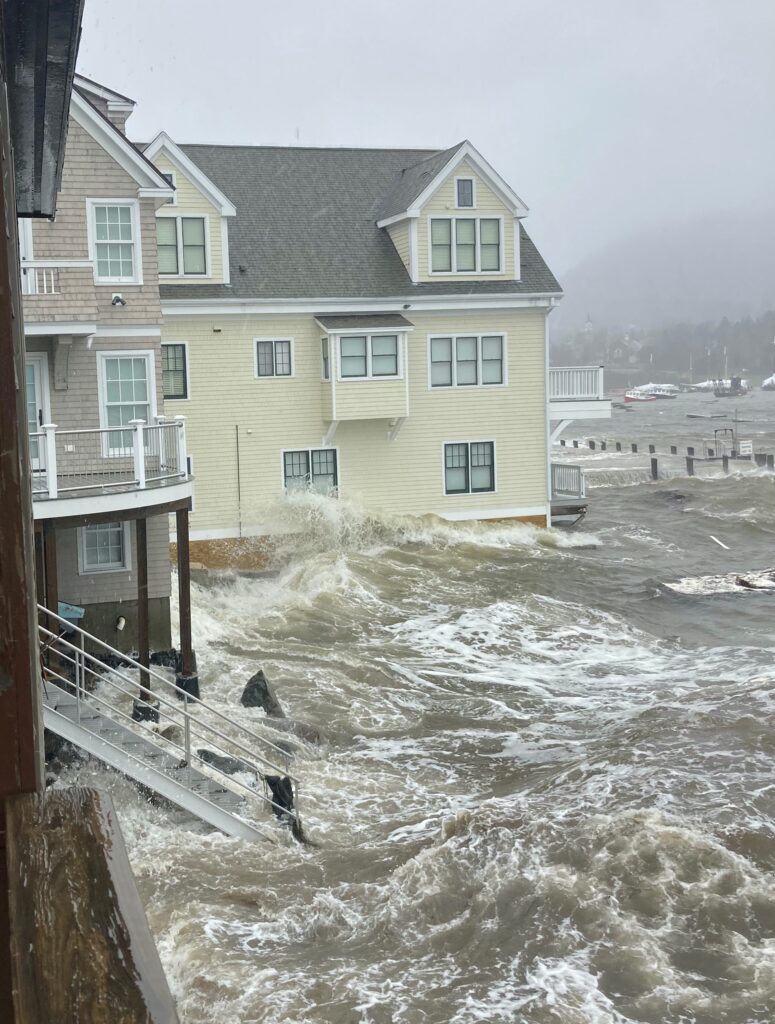
While Mother Nature keeps reminding us that sea level rise is here to stay, the proposed 2025 Camden budget shows the reality that town costs are also rising, exponentially—just like the sea and global temperatures. Camden taxpayers are in for a shock.
While it’s not sexy, engaging in budget discussions is a citizen’s responsibility. Meetings are held every Thursday in March, at 6 pm in the French Conference room. This link takes you to the general information. You can read about the schedule/process here, and the proposed budget here. You can find the link to listen to the first meeting with numbers here and for future meetings go here and click on the budget meeting.
Camden’s 2020 annual budget was $7 million; in 2022 it was $9 million; this year’s (FY25) proposed is nearly $13 million. The proposed budget presents a 13.2% increase in expenditures over last year.
Highlights: a new burner and air conditioning for the Opera House (green energy? not clear); new purchases include a sidewalk plow ($110,000) and groomer for the Snow Bowl ($314,000). Also included are several new personnel (public safety, communications, et al.). You’ll also find increases in fees for the Dam Control agent, $150,000 for new Steamboat Landing floats, and a $150,000 annual stipend to cover Snow Bowl deficits.
Climate change is noted as a driver of several of these costs. Read the town manager’s note—on page two here—for more.
What’s not mentioned anywhere are plans to cut Camden’s fossil fuel emissions—there are blanks in the Energy Conservation line of the Capital Reserve Fund (although there are reserve funds for trees, harbor work, river restoration, and dams).
Nor is there any mention of increasing our solar capacity. Rockland’s FY24 budget proudly proclaims “$150,000 (approx.) in savings realized from solar net energy billing credits in calendar year 2022.”
Nor is there any mention of hiring a sustainability coordinator, as recommended by the Energy and Sustainability Committee and Watershed school in its excellent 2020 report “Turning the Tide: Preliminary Climate Action for Camden.”
Rethinking How We’re Budgeting and Governing
Up until 2019-2021, Camden had a Parks and Rec. Committee, a Community Development and Economic Advisory Committee, and an Energy and Sustainability Committee (see the town web page here). Budgeting was a year-round collaborative process between citizens serving on these committees with the appropriate town staff. (Budgets are currently made by the town manager and department heads and presented to a budget review group over a four-week period—March.)
The Parks and Rec. Committee used to oversee the Snow Bowl/RMRA budget, brainstorming on pricing and four-season options for the area. The Energy and Sustainability Committee helped the town be proactive in its energy needs, keeping the town on track to meet our Global Covenant of Mayors pledge to reduce emissions and create a climate action plan.
A revitalized energy committee could review the purchase and expansion of our Sagamore solar farm and revisit the expensive Siemens contract that updated heating and cooling in several town buildings but did not move us toward substantially lower expenses or emissions. If we don’t look back at our past contracts and decisions how do we know if they’ve achieved our intended outcome?
The revived energy and sustainability committee could also help provide incentives for residents to reduce home energy needs; create a plan for municipal EV charging infrastructure; co-develop Ebike plans for town commuters; work with Parks and Rec. to move our parks from lawn-based groundcover to more pollinator-beneficial groundscapes.
The revitalized Community Development and Economic Advisory Committee could help foster green business development, creating commercial solar panel incentives, and explore the role that EV charging networks and green infrastructure play in fostering business. This group could also work with businesses on creating a plan for vital waterfront development in the shadow of sea level rise.
Missing Proactive Climate Action
While the FY25 budget reacts to the impacts of climate change, it does little toward prioritizing the changes needed in Camden to prevent a continuation of the climate crisis.
We need climate leaders and committees pushing for a budget that creates a more sustainable Camden—not only independent ones like CamdenCAN, but also ones that work more directly with the Select Board.
Resilience Planning, Too
In addition to these recharged and strengthened citizen committees, and because of the pressures of the climate crisis, Camden also needs to host a series of town-wide resilience workshops, as many of our neighbors have done. A resilience plan involves these steps:
- understand exposure; 2. assess vulnerabilities and risks; 3. investigate options; 4. prioritize and plan; 5. take action.
Among the areas that Camden residents need to chat about, in full town-wide climate resiliency workshops, are these taxpayer-owned areas: Snow Bowl, Yacht Club (leased to a private group), Steamboat Landing, and the Public Landing. Harbor Park, while managed with the Library, also fits into this category.
Send letters to the editor and to Select Board members and town staff today asking for these resilience forums—conducted with climate experts as well as town staff, citizens, and others. Select Board emails go to: tocselectboard@camdenmaine.gov. And at the same time let them know how you feel about the FY25 budget and the ongoing loss of town committees.
Sea Level Flooding, Again
Sunday March 10, 2024, brought the third 100-year storm in two months. At the Public Landing waves washed up on the parking lot; Harbor Park got inundated three days in a row, not just on the day of the storm; waves broke onto the Yacht Club lawn, flooding the building and washing away the gravel placed the day before; Waterfront and Fresh restaurants were flooded yet again. Strong seas churned at Laite Beach and Steamboat Landing.
Sea-level rise flooding is Camden’s new reality—it won’t reverse until we drastically reduce emissions.
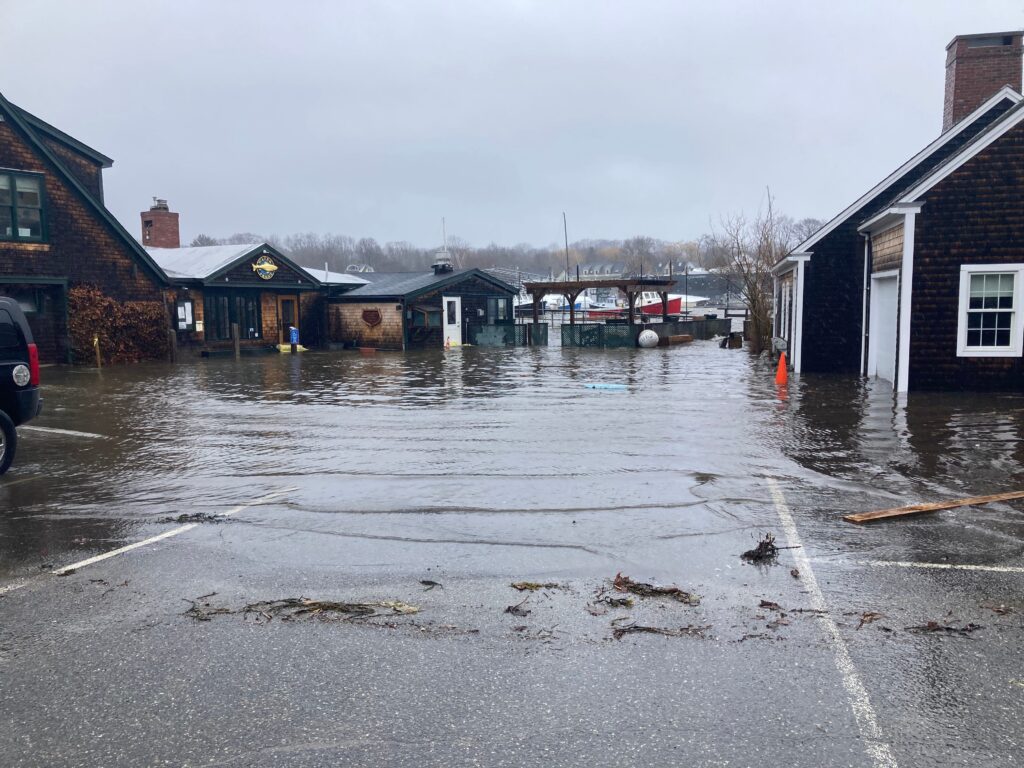
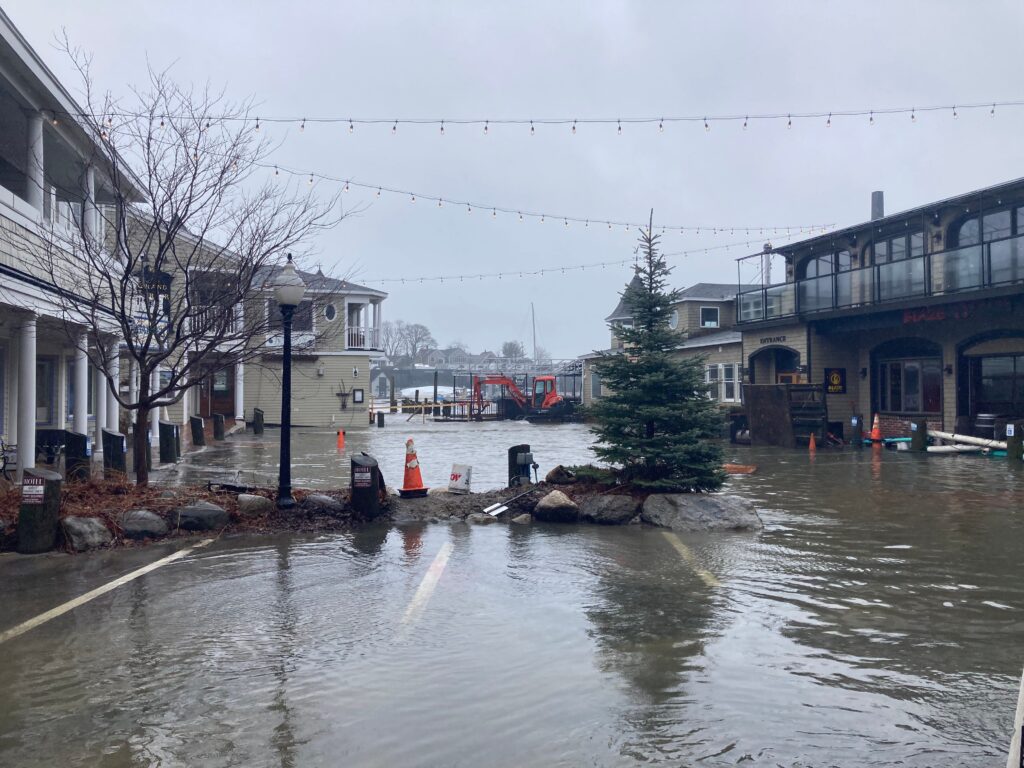
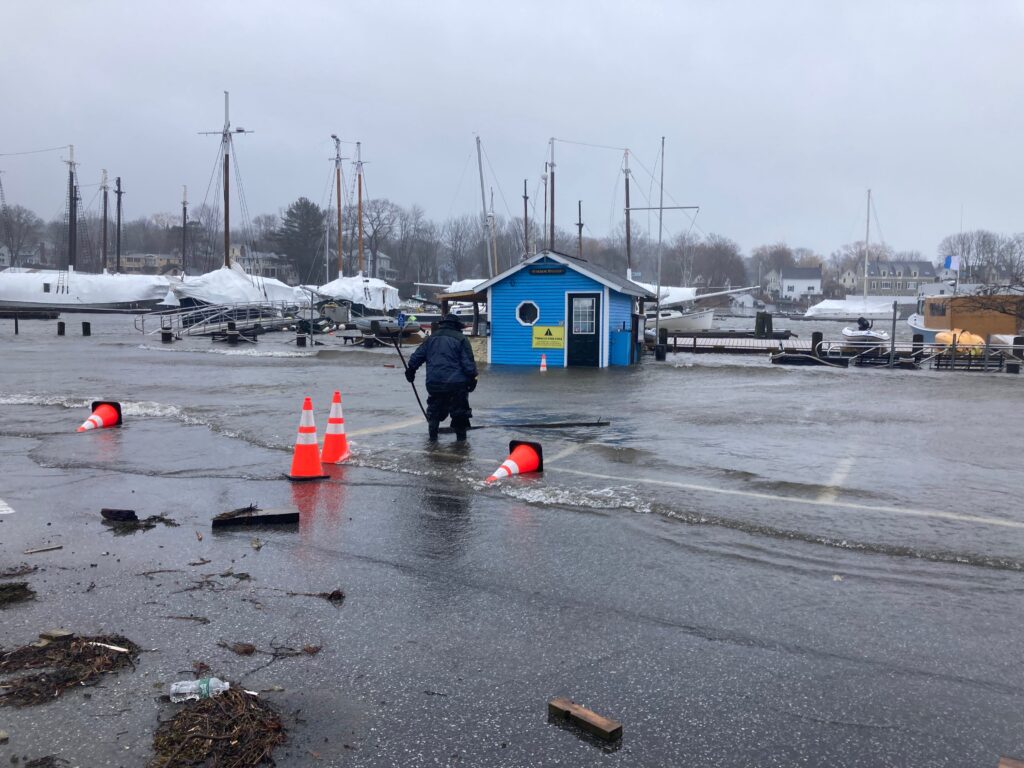
March 10, 2024, storm, coinciding yet again with a high astronomical tide.
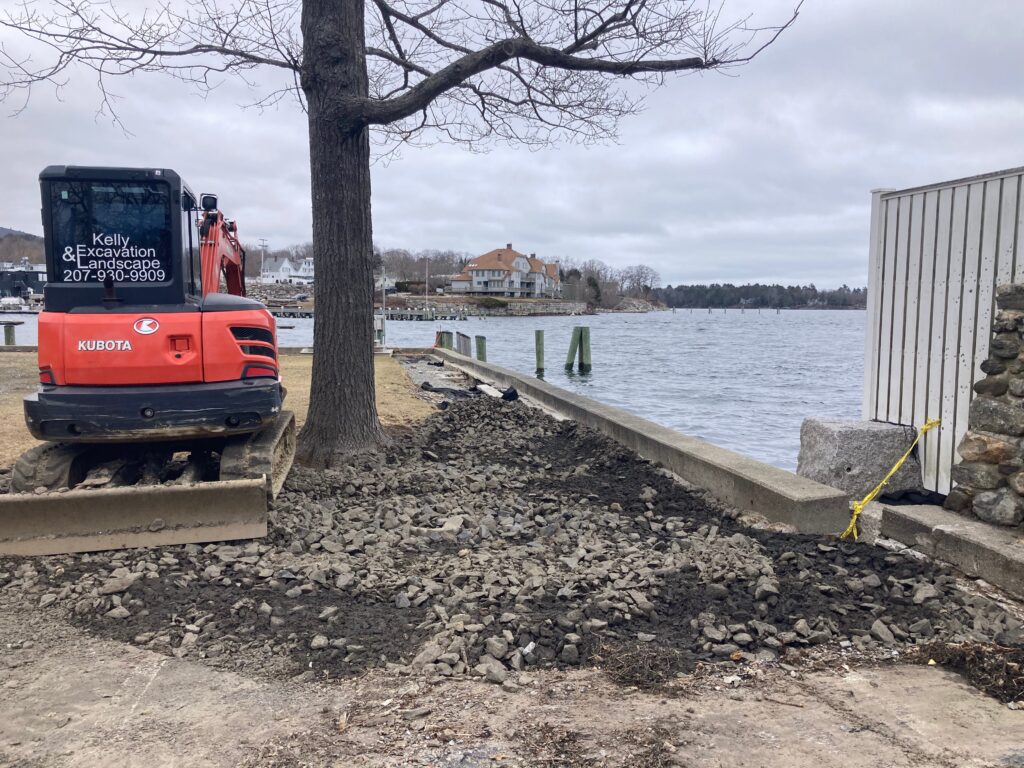
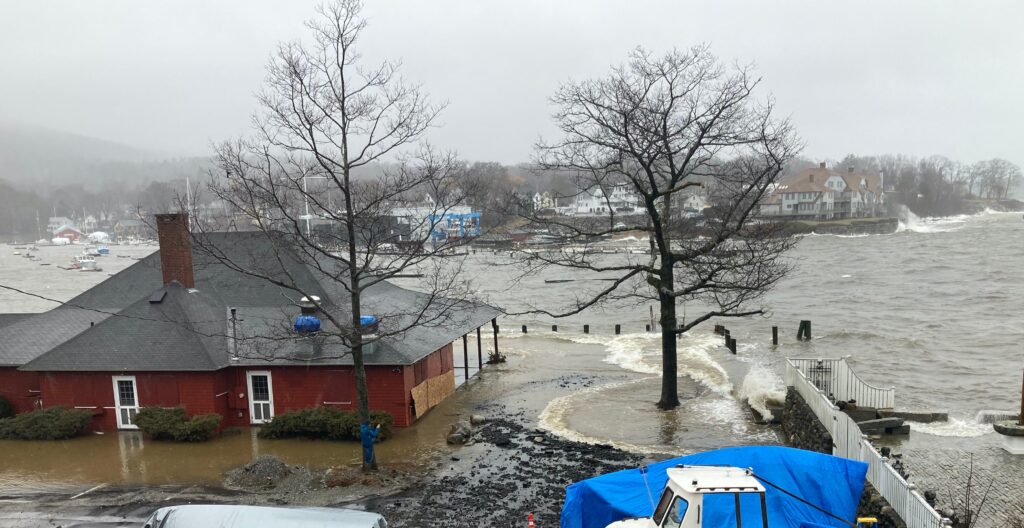
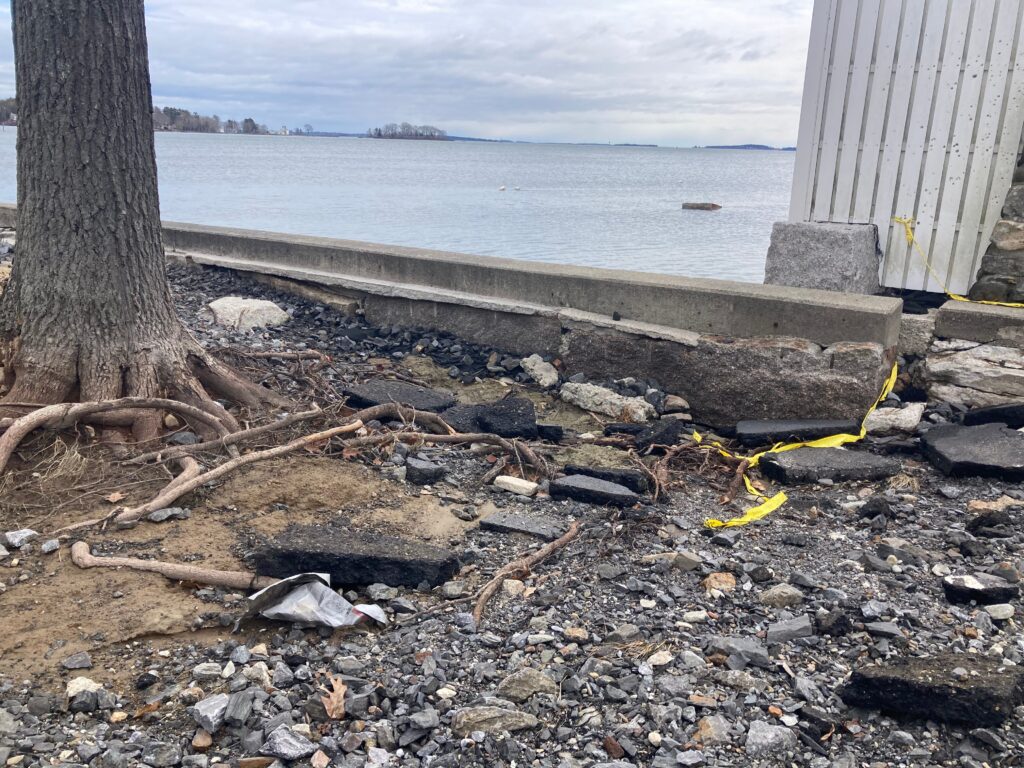
March 9, March 10, and March 11 at the Camden Yacht Club.
Upcoming CamdenCAN Events
3/13/24, Wednesday, 6:30-8:00 pm, French Conference Room, 16 Washington St., Camden and via zoom (Join Zoom Meeting). Camden Talks Climate Panel, “Plugging Into Solar,” with Pete Kalajian, Brian Lightbody, David Babski—all Camden residents and homeowners. They’ll share their home solar experiences and there will be a robust Q&A.
Drop-In, Ongoing Climate Conversation Circles, Camden Public Library: Wednesday, 3/20/24, 5-5:45 pm; Thursday, 3/21/24, 1-2:30 pm. See the description here. (No need to have attended a previous conversation.)
4/4/24, Thursday, 6:30-8:00 pm, Camden Public Library Maritime Month, Camden Talks Climate Panel, Kerry Emanuel, emeritus professor of atmospheric science at MIT, “Hurricanes In Mid-coast Maine: Past, Present, and Future.” After reviewing the long and interesting history of hurricanes that have affected Maine, Emanuel will talk about recent scientific advances that say something about how hurricane risk is changing in mid-coast Maine, focusing on Camden. He will also discuss the recent destructive winter storms.
4/25/24, Thursday, 5:30-7:30 pm, First Congregational Church, Climate Potluck. Come celebrate Earth Week, meet other climate-concerned neighbors, and share a meal. We’ll have chances to talk about recent suggestions like climate change education, a push for more electric school buses, municipal solar, home pee recycling (check this out—liquid gold), lawn rewilding, home weatherization.
Other Local Green Events/Opportunities
3/20/24, Wednesday, 6 pm, Rockport Public Library, “Getting Our Communities Ready for Clean Energy: Why and How,” Emma Wendt, U.S. Energy Dept. Wendt will discuss opportunities for propelling rural Maine toward a sustainable energy landscape. She will also discuss actionable steps where citizens can become catalysts for change. Beyond the mechanics of building clean energy infrastructure, Wendt will illuminate the vital necessity of fostering inclusive community involvement to drive impactful investments.
4/18/24, Thursday, 4-6 pm, Camden Snow Bowl. The town has been having non-public groups meet about the Snow Bowl’s future; this one is a Snow Bowl public forum to talk about the trail planning recently undertaken by a consulting group.
Concluding Thoughts
The climate crisis is going to break our banks. Literally. To stay within our means—and change the course of climate change—we’ll have to change our spending priorities. And we’ll have to walk away from some beloved treasures (harbor parcels, snowmaking). These are tough realities.
Yet the future could be even more vibrant, with thriving waterfront parks offering public small-boat access and a popular four-season recreation area promoting human-powered activities like fat-tire biking.
We’ll need to keep talking about these realities, facing them head on, in public forums—meetings, revitalized committees, workshops—that promote these conversations. And we need a budgeting process where the realities and needs of the natural world are prioritized, then woven into other needs for public safety and the administration of town services.
We’d like to see emissions reduction and proactive climate work become a Camden priority, reflected in the budget.
Mother Nature won’t retreat or lessen her storms until we control emissions. (In fact, she’ll keep accelerating her impacts as temperatures rise.)
